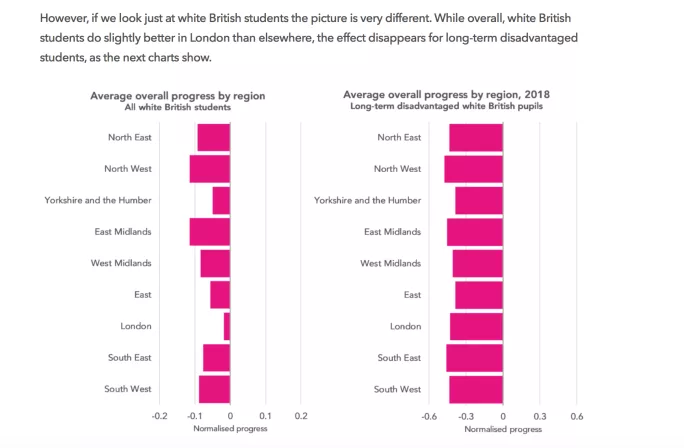The “London effect” in improved school performance is larger than it was five years ago but is negligible among poorer white pupils in the capital, new analysis shows.
Research reveals that the gap in progress scores achieved by pupils in London and the rest of the country is larger than it was in 2013.
The difference in performance is greater between poorer pupils from London and those in the rest of the country.
Research: Is the ‘London effect’ down to ethnicity?
Quick read: Why do London schools do better?
Hinds: Education secretary questions impact of London Challenge
However, a new blogpost by Natasha Plaister and Dave Thomson for FFT Education Datalab also says that this does not apply to all deprived pupils in London.
The analysis shows that the “London effect is negligible for long-term disadvantaged white British pupils” when looking at their Progress 8 scores.
Ms Plaister and Mr Thomson have written two linked blogposts analysing the London effect five years on.
The new posts analyse whether the difference between London school performance and the rest of the country today can be explained by the ethnicity of the pupils, as research carried out in 2014 had concluded.
Schools and the ‘London effect’
Professor Simon Burgess, of the University of Bristol, had found that the difference in school performance was entirely down to the higher number of ethnic-minority pupils in London.
Professor Burgess showed that students in Birmingham outperformed those in the rest of the country in a similar way to students in London - backing the argument that the effect was explained by the differences in pupil demography in the two cities compared with the rest of the country.
The new FFT Education Datalab post says that “the Birmingham effect” does still exist in the 2018 results and that, like the London effect, is larger for disadvantaged students.
However, the analysis has also revealed that the differences in pupil ethnicity between London and the rest of the country do not entirely account for the difference in school performance in the capital.
Ms Plaister and Mr Thomson said: “What we’ve seen in the 2018 data backs up Burgess’ findings on white British students, but things look rather different when we consider Asian students.
“We see a clear difference in performance between Asian students in London and elsewhere, but very little difference for white British students, especially those who are disadvantaged.
“So the London effect can’t be entirely explained by the higher proportion of white British students outside London. Although this group of pupils aren’t making any more progress in London than elsewhere, some groups of pupils are.”
Earlier this year the Education Datalab produced research showing there was little difference between London and coastal schools for pupils in the most disadvantaged groups - such as long term disadvantaged white children.
The new Education Datalab post also suggests that the larger overall London effect in 2018 compared with five years ago could be down to exam and accountability reforms since 2013, which have seen many non-GCSE qualifications removed from league tables.
It says: “Schools in London were less likely to enter pupils in non-GCSEs back in 2013 and so were better placed to respond to the Wolf reforms and the introduction of Progress 8.
“Schools in other parts of the country are now doing far fewer non-GCSEs. This goes some way to explaining why the gap has emerged since 2013.”





